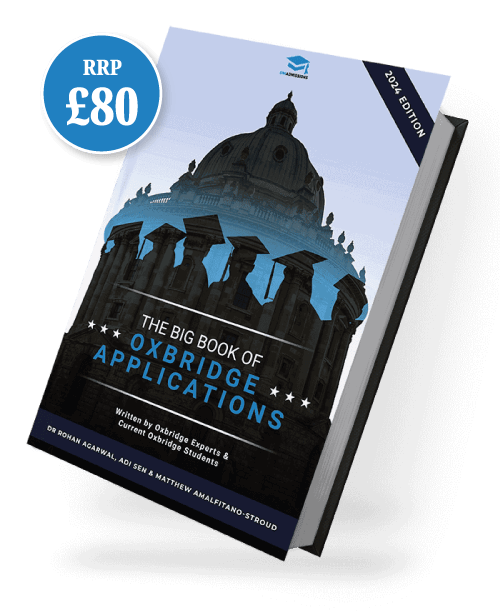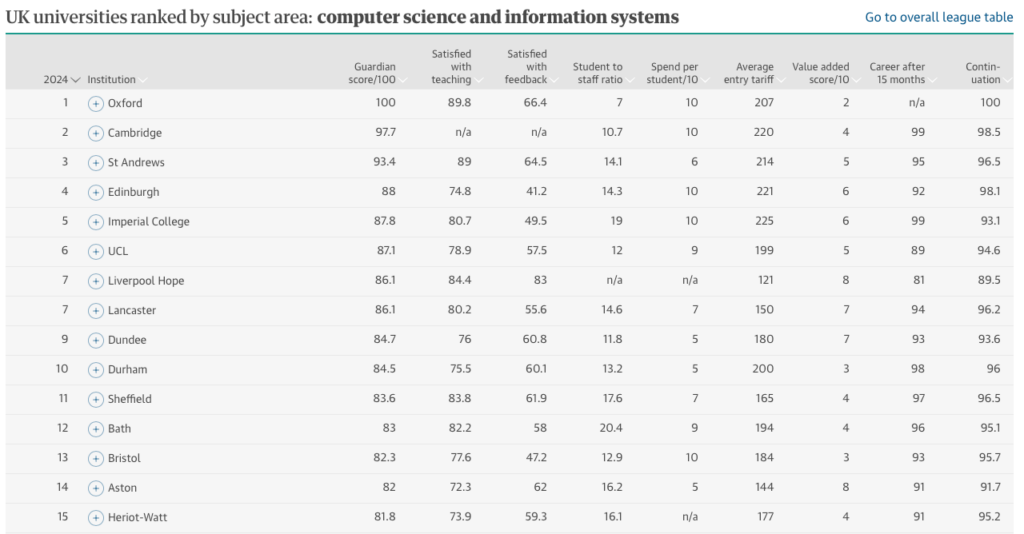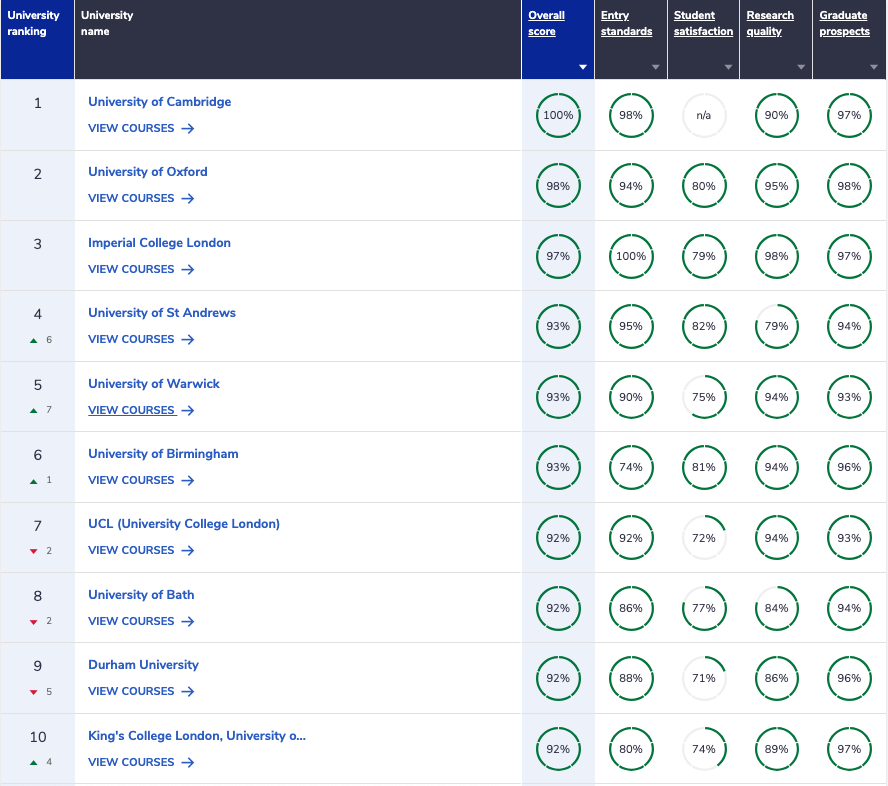If you’re looking to find the right Computer Science degree, you may feel overwhelmed by the 100+ options available in the UK.
It’s become one of the most popular and most competitive degrees over the last 20 years and is now taught in a majority of UK universities, including many of the most prestigious.
As with every other popular degree, ranking tables are made annually to help applicants with their decision-making by presenting important data in an easily digestible manner and providing a numerical ranking of all the available courses.
Who Makes The Computer Science rankings?
Although both tables collect data similarly and from comparable sources, the rankings can differ significantly, reflecting how each organisation interprets the data and incorporates unique factors.
This might seem puzzling, given that both use objective data in their processes, but we’ll delve into why these rankings differ later in this guide. For now, let’s examine each organisation and review the top 25 entries on their respective tables.
Want to get your offer to study Computer Science at Oxbridge?
Hoping to study Computer Science at Oxford or Cambridge? You’ll need to write the perfect Personal Statement, perform well on your admissions test and interview like a pro to get your dream Oxbridge Computer Science offer.
Discover our Full-Blue Computer Science Programme for comprehensive admissions support by clicking the button below to enrol and triple your chances of success.
The Guardian Computer Science Rankings
To create their Computer Science rankings, The Guardian uses the following metrics:
Guardian score/100 – rating of excellence based on a combination of the other factors.
Satisfied with the course – the rating of the overall quality of the course, given by final-year students in the latest National Students Survey (NSS) given as a percentage.
Satisfied with the teaching – the rating of the quality of teaching on the course given by final-year students in the latest NSS.
Satisfied with feedback – the rating of the feedback and assessment, given by final-year students in the latest NSS.
Student to staff ratio – number of students per member of teaching staff.
Spend-per student/10 – money spent on each student, excluding academic staff costs, given as a rating out of ten.
Average entry tariff – typical UCAS scores of young entrants to the department.
Value-added score/10 – this score compares students’ degree results with their entry qualifications, to show how effectively they are taught – given as a score out of ten.
Career after 15 months – percentage of graduates who find graduate-level jobs, or are in further study at professional or higher education level, within 15 months of graduation.
Continuation – percentage of first-year students continuing to second-year.
To source this information, The Guardian gathers data from sources such the National Student Survey (NSS) (including student satisfaction rates) and from the universities directly. This mixture of subjective and objective factors is then interpreted in an unbiased way to ensure the rankings accurately reflect everything they collected.
The Guardian Computer Science University Rankings 2025
Here are the top 25 entries of The Guardian’s league table for Computer Science, including the results for 2025 and 2024 compared:
| Postition | University | Previous Position (2023) |
|---|---|---|
| 1 | University of Cambridge | 2 (>1) |
| 2 | University of St. Andrews | 3 (>1) |
| 3 | University of Oxford | 1 (<2) |
| 4 | Imperial College London | 5 (>1) |
| 5 | University of Dundee | 9 (<4) |
| 6 | University of Edinburgh | 4 (<2) |
| 7 | University of Bristol | 13 (>6) |
| 8 | University College London (UCL) | 6 (<2) |
| 9 | University of Sheffield | 11 (>2) |
| 10 | University of Bath | 12 (>2) |
| 11 | Durham University | 10 (<1) |
| 12 | Aston University | 14 (>2) |
| 13 | Lancaster University | 7 (<6) |
| 14 | University of Manchester | 18 (>4) |
| 15 | University of Birmingham | 47 (>32) |
| 16 | University of Stirling | 33 (>17) |
| 17 | University of Sunderland | 25 (>8) |
| 18 | King’s College London | 17 (<1) |
| 19 | University of Glasgow | 22 (>3) |
| 20 | University of Trinity Saint Daivd | 50 (>30) |
| 21 | University of Warwick | 75 (>54) |
| 22 | University of Surrey | 20 (<2) |
| 23 | Queen Mary, University of London | 22 (<1) |
| 24 | Loughborough University | 21 (<3) |
| 25 | University of East Anglia (UEA) | 16 (<9) |
The Guardian’s ranking for Computer Science in 2025 has seen a considerable amount of change compared to 2024, with only 2 universities remaining in the same position as the previous year. But what does this data tell us?
In the top ten, we’ll find some very common high-ranking universities, including Oxford, Cambridge, UCL and Imperial College London (four of the five G5 universities), as well as Bristol, Sheffield and Edinburgh – three other Russell Group universities – and St. Andrews, which are all common universities to find ranking this high.
The University of Bath and the University of Dundee are the only remaining entries in the Top 10, which aren’t common to see so high. Outside of the Top 10, there were various major increases in placement for certain universities compared to 2024. These include Birmingham (47th – 16th), Trinity Saint David (50th – 20th) and Warwick (75th – 21st).
However, other universities saw steep drops in their placements, with several falling out of the Top 25. These include Heriot-Watt (15th – 42nd) and York (24th – 55th). Southampton also just missed the mark, falling from 19th to joint 26th.
The Complete University Guide Computer Science Rankings
Overall score – the total score calculated by The Complete University Guide’s independent and trusted methodology.
Entry standards – the average UCAS tariff of new students entering university.
Student satisfaction – a guide to how satisfied students are with the quality of teaching they receive.
Research quality – a measure of the quality of the research undertaken by the university.
Research intensity – a measure of the proportion of staff involved in high-quality research at the university.
Graduate prospects – outcomes – a guide to the success of graduates after leaving university.
Graduate prospects – on track – a measure of whether recent graduates agree that their current activity fits with their future plans.
While Complete University Guide combines different data points into larger categories, the overall results convey the same thing as The Guardian’s lists with fewer metrics. The data is gathered from similar sources – NSS and universities – but the interpretation and scoring of the data uses a different system. This is why we see many differences in placement between the two lists.
Complete University Guide Computer Science University Ranking Table 2025
Next, here are the top 25 entries of the Complete University Guide Computer Science ranking table, displaying the results for 2025 and a comparison to 2024’s results:
| Postition | University | Previous Position (2024) |
|---|---|---|
| 1 | University of Cambridge | 1st (=) |
| 2 | University of Oxford | 2nd (=) |
| 3 | Imperial College London | 3rd (=) |
| 4 | University of St. Andrews | 10th (>6) |
| 5 | University of Warwick | 5th (<1) |
| 6 | University of Birmingham | 7th (>1) |
| 7 | University College London (UCL) | 5th (>2) |
| 8 | University of Bath | 6th (<2) |
| 9 | Durham University | 4th (<5) |
| 10 | King’s College London | 14th (>4) |
| 11 | University of Manchester | 13th (>2) |
| 12 | University of Bristol | 15th (>3) |
| 13 | University of Sheffield | 11th (<2) |
| 14 | University of Edinburgh | 20th (<6) |
| 15 | University of Southampton | 21st (<6) |
| 16 | University of Glasgow | 16th (=) |
| 17 | Loughborough University | 17th (=) |
| 18 | University of Dundee | 28th (>10) |
| 19 | University of Exeter | 19th (=) |
| 20 | University of Leeds | 23rd (>3) |
| 21 | University of York | 18th (<3) |
| 22 | Queen’s University Belfast | 21st (<1) |
| 23 | Lancaster University | 22nd (<1) |
| 24 | University of Nottingham | 20th (<4) |
| 25 | Royal Holloway, University of London | 25th (=) |
The Complete University Guide’s rankings for Computer Science have remained fairly stable in 2025, with far less movement than The Guardian’s list.
In the top ten, we can first see that the top three entries have all remained unchanged and are universities that are frequently at the top of rankings. The rest of the top ten are fairly standard high-ranking universities, with only two non-Russell Group unis (Bath and St. Andrews).
Below the top ten, there really aren’t many unusual or interesting entries in the rest of the list, as these are all generally well-regarded universities.
As for position movements, the biggest change in placement was by the University of Dundee, which rose ten places from 28th to 18th. The biggest drop in placement is shared between Edinburgh and Southampton, which each fell 6 places.
Access "The Big Book Of Oxbridge Applications" For FREE
Oxford and Cambridge teach the highest-rated Computer Science degrees in the UK, so download The Big Book Of Oxbridge Applications for free here to learn what you need to know about Oxbridge Computer Science and its difficult application process. Through over 350 pages, you’ll find:
- Over 40 admissions test practice questions
- 28 example Oxbridge Personal Statements
- Interviews with Oxbridge students and graduates
- Additional downloadable resources
Fill in your details below to claim your digital copy today!

The Best and Worst UK Universities For Computer Science
With a better understanding of each league table, let’s now explore the top and bottom five entries of each list. Remember that, while these lists are based on a lot of very credible data, these placements are in now way definitive and change from year to year.
Beyond that, there are also factors that these tables can’t consider, mostly down to your own preferences and situation, so don’t feel that these are the universities you have to apply for or avoid.
Best Universities For Computer Science UK
Firstly, let’s look at the top rated universities from each list to see which ones are generally considered the best in the UK for Computer Science.-
Complete University Guide
- University of Cambridge
- University of Oxford
- Imperial College London
- University of St. Andrews
- University of Warwick
The Guardian
- University of Cambridge
- University of St. Andrews
- University of Oxford
- Imperial College London
- University of Dundee
As we can see, Cambridge takes the top spots on both lists, with Oxford coming in both second and third. This isn’t a surprise as Oxbridge ranks at the top for almost every subject they teach.
Beyond that though, we see more universities that often rank in the top five, including St.Andrews and Imperial College London. Of these, the only university that isn’t a member of the Russell Group is St. Andrews, which is often the highest-ranked university in Scotland.
The 5th entry is different on each list, with Complete University Guide selecting another Russell Group university (Warwick) and The Guardian selecting another Scottish university (Dundee). Each of these entries performed fairly well on the other list, with Warwick ranked 21st by The Guardian and Dundee ranked 18th by Complete University Guide.

Worst Universities For Computer Science UK
Next, let’s look at the lowest-ranked universities for Computer Science. Bear in mind that these aren’t objectively “bad” or “the worst” universities, just that they ranked lower than others on the list.
Complete University Guide
- University of Bedfordshire
- De Montford University
- University of West of Scotland
- University of Westminster
- Canterbury Christ Church University
The Guardian
- Canterbury Christ Church University
- Wrexham University
- University of Gloucestershire
- University of Central Lancashire
- University of Bedfordshire
Between the two lists, we can see a wide range of universities from different parts of the UK, including London, the Midlands, Scotland and Wales.
The lowest-ranked university by Complete Uni Guide was Bedfordshire, which was ranked 5th lowest by The Guardian. Meanwhile, The Guardian ranked Canterbury Christ Church University at the bottom, with both of these universities appearing on both lists.
It can’t be understated that these rankings shouldn’t be taken as a sign to completely avoid these universities – if you find their teaching styles, campuses or facilities appealing then you should still consider applying.
Which Ranking Table Should I Follow?
The Guardian’s rankings tend to focus more on student perspectives, whereas The Complete University Guide emphasises research, employment, and broader student satisfaction. Depending on which factors matter most to you, one table might be more helpful than the other. but neither table is inherently superior overall.
Instead, let’s consider this: should ranking tables in general be a major part of your decision-making process? While they’re useful for starting your research and gaining a general sense of each university’s quality, they’re just one of many factors to consider.
Here’s an example – If you’re primarily focused on objective data regarding the admissions process, your first step should be to review the entry requirements and acceptance rates for each university you’re considering.
If you’re more interested in high-ranking universities like Oxford and Cambridge, you’re going to have to contend with the more demanding application process, high entry requirements and low acceptance rates (13.8% at Oxford and 16.6% at Cambridge). Therefore, you need to ensure that you’re a viable candidate for these universities based on your current/predicted grades.
Statistics aren’t the only things that count though. Remember that university is about much more than just studies as most students will be at their chosen university 24/7 for at least 3 years. Therefore, you need to be sure you like the campus, the facilities and the area before committing to a choice. Attending open days is a perfect way to get a feel for a university, so be sure to visit the options that most appeal to you.
Finally, don’t dismiss lower-ranking universities outright. Although they may not match the highest-ranked institutions, remember that these places are typically exceptional in their teaching. Most UK universities still offer a high-quality education, even if they have shortcomings that others don’t. If a lower-ranked university appeals to you, it’s still worth applying, as it could be a great fit and will generally be less competitive. The key is to ensure you’ve conducted thorough research from multiple perspectives.
Conclusion
That’s the end of our look at Computer Science university rankings in the UK. To summaries, these tables are certainly useful tools, but there’s only so much the data-driven rankings can tell us. Personal preference will always take president over scores in particular categories, though if your values align with what’s measured within the ranking, then utilising them may be more helpful.
Most importantly, these rankings aren’t definitive or official. Tables will differ from one another, so it’s down to you to determine which one you trust more and how much importance you actually place on the rankings. As long as you end up attending a university that you like, the method you used to decide will have been successful.
Worried about your Oxbridge chances? Our offer success rate is 57%
Applying to Oxbridge is immensely competitive and it is crucial that you give yourself the best chance of success. We help you craft the perfect Personal Statement, achieve a highly competitive Admissions Test score and teach you how to Interview effectively – covering all areas of your Oxbridge application.
Discover our Full-Blue Computer Science Programme now to learn how you can triple your chances of success.









